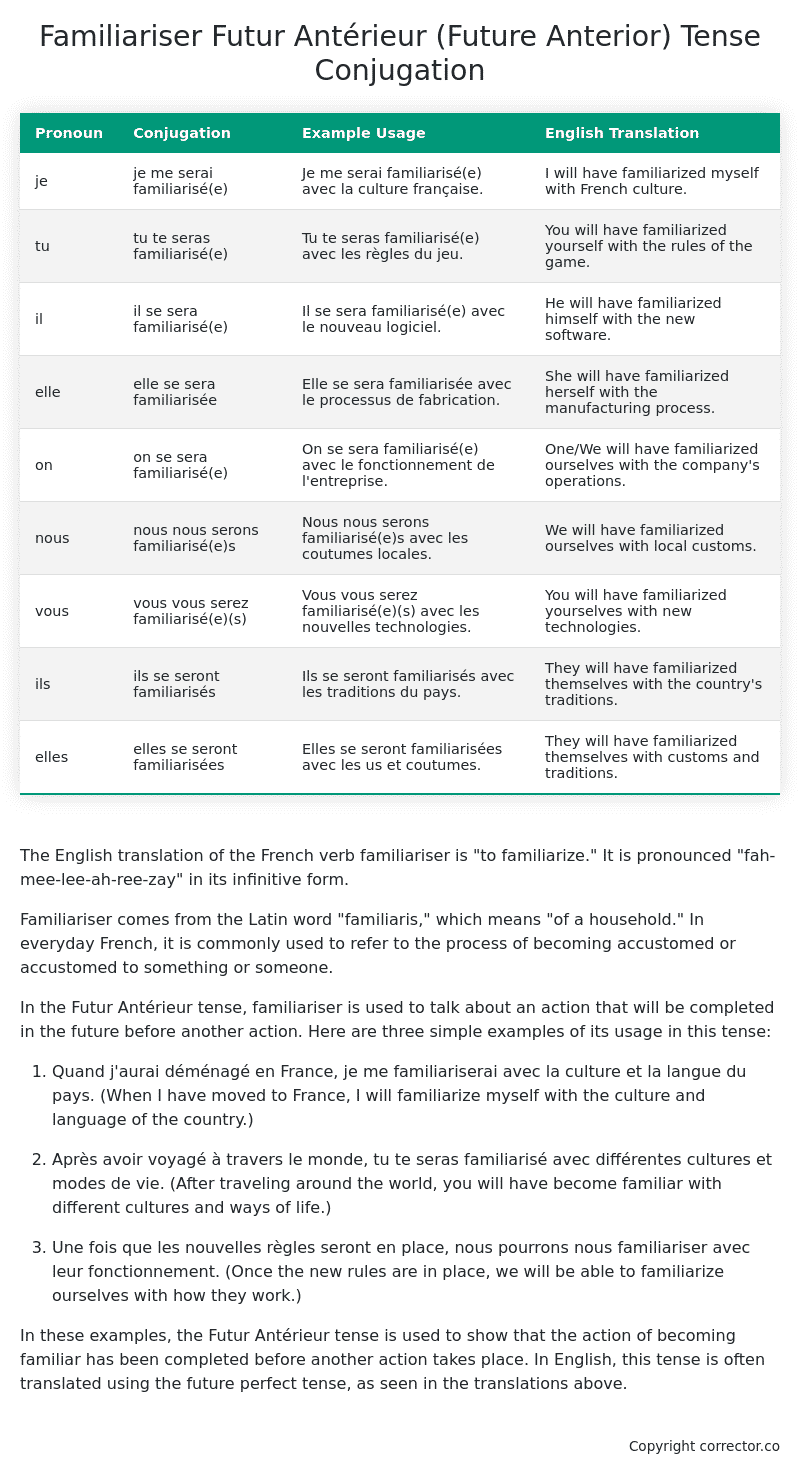Futur Antérieur (Future Anterior) Tense Conjugation of the French Verb familiariser
Introduction to the verb familiariser
The English translation of the French verb familiariser is “to familiarize.” It is pronounced “fah-mee-lee-ah-ree-zay” in its infinitive form.
Familiariser comes from the Latin word “familiaris,” which means “of a household.” In everyday French, it is commonly used to refer to the process of becoming accustomed or accustomed to something or someone.
In the Futur Antérieur tense, familiariser is used to talk about an action that will be completed in the future before another action. Here are three simple examples of its usage in this tense:
-
Quand j’aurai déménagé en France, je me familiariserai avec la culture et la langue du pays. (When I have moved to France, I will familiarize myself with the culture and language of the country.)
-
Après avoir voyagé à travers le monde, tu te seras familiarisé avec différentes cultures et modes de vie. (After traveling around the world, you will have become familiar with different cultures and ways of life.)
-
Une fois que les nouvelles règles seront en place, nous pourrons nous familiariser avec leur fonctionnement. (Once the new rules are in place, we will be able to familiarize ourselves with how they work.)
In these examples, the Futur Antérieur tense is used to show that the action of becoming familiar has been completed before another action takes place. In English, this tense is often translated using the future perfect tense, as seen in the translations above.
Table of the Futur Antérieur (Future Anterior) Tense Conjugation of familiariser
| Pronoun | Conjugation | Example Usage | English Translation |
|---|---|---|---|
| je | je me serai familiarisé(e) | Je me serai familiarisé(e) avec la culture française. | I will have familiarized myself with French culture. |
| tu | tu te seras familiarisé(e) | Tu te seras familiarisé(e) avec les règles du jeu. | You will have familiarized yourself with the rules of the game. |
| il | il se sera familiarisé(e) | Il se sera familiarisé(e) avec le nouveau logiciel. | He will have familiarized himself with the new software. |
| elle | elle se sera familiarisée | Elle se sera familiarisée avec le processus de fabrication. | She will have familiarized herself with the manufacturing process. |
| on | on se sera familiarisé(e) | On se sera familiarisé(e) avec le fonctionnement de l’entreprise. | One/We will have familiarized ourselves with the company’s operations. |
| nous | nous nous serons familiarisé(e)s | Nous nous serons familiarisé(e)s avec les coutumes locales. | We will have familiarized ourselves with local customs. |
| vous | vous vous serez familiarisé(e)(s) | Vous vous serez familiarisé(e)(s) avec les nouvelles technologies. | You will have familiarized yourselves with new technologies. |
| ils | ils se seront familiarisés | Ils se seront familiarisés avec les traditions du pays. | They will have familiarized themselves with the country’s traditions. |
| elles | elles se seront familiarisées | Elles se seront familiarisées avec les us et coutumes. | They will have familiarized themselves with customs and traditions. |
Other Conjugations for Familiariser.
Le Present (Present Tense) Conjugation of the French Verb familiariser
Imparfait (Imperfect) Tense Conjugation of the French Verb familiariser
Passé Simple (Simple Past) Tense Conjugation of the French Verb familiariser
Passé Composé (Present Perfect) Tense Conjugation of the French Verb familiariser
Futur Simple (Simple Future) Tense Conjugation of the French Verb familiariser
Futur Proche (Near Future) Tense Conjugation of the French Verb familiariser
Plus-que-parfait (Pluperfect) Tense Conjugation of the French Verb familiariser
Passé Antérieur (Past Anterior) Tense Conjugation of the French Verb familiariser
Futur Antérieur (Future Anterior) Tense Conjugation of the French Verb familiariser (this article)
Subjonctif Présent (Subjunctive Present) Tense Conjugation of the French Verb familiariser
Subjonctif Passé (Subjunctive Past) Tense Conjugation of the French Verb familiariser
Subjonctif Imparfait (Subjunctive Imperfect) Tense Conjugation of the French Verb familiariser
Conditionnel Présent (Conditional Present) Tense Conjugation of the French Verb familiariser
Conditionnel Passé (Conditional Past) Tense Conjugation of the French Verb familiariser
L’impératif Présent (Imperative Present) Tense Conjugation of the French Verb familiariser
L’infinitif Présent (Infinitive Present) Tense Conjugation of the French Verb familiariser
Struggling with French verbs or the language in general? Why not use our free French Grammar Checker – no registration required!
Get a FREE Download Study Sheet of this Conjugation 🔥
Simply right click the image below, click “save image” and get your free reference for the familiariser Futur Antérieur tense conjugation!

Familiariser – About the French Futur Antérieur (Future Anterior) Tense
Construction
Common Everyday Usage Patterns
Interactions with Other Tenses
For example
Summary
I hope you enjoyed this article on the verb familiariser. Still in a learning mood? Check out another TOTALLY random French verb conjugation!


